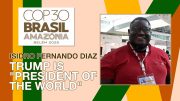In response to the article at TheNewAmerican.com, Simon Dunford, UEA Press Officer, wrote:
We are extremely surprised at the inaccurate and defamatory claim in the final paragrah [sic]…. Our scientists were exonerated of any dishonesty or malpractice by a series of independent reviews…. Readers of your article would not know that they had been cleared of any such accusations.
What Dunford calls “independent reviews” have, however, been condemned in the media as whitewashed scams that would have made Nixon blush. The Canada Free Press described them as “the most transparent, manipulated brazen cover up possible.” The Financial Post said that “there were serious problems with the conduct of the inquiries. Public and policymakers alike can no longer regard their findings as reliable.” The Telegraph reported that the outcome of the inquiries showed “there is no more a culture of accountability and job forfeiture for controversial conduct in AGW circles than there is in parliamentary ones…. The brand remains toxic.”
Why did the investigations earn such negative reviews? Let’s take a look.
First, we have the Independent Climate Change E-mail Review (CCE), commissioned and paid for by UEA. At its launch, Chairman Sir Muir Russell bragged about the members’ impartiality, promising none would have any “links to either the University or the Climate Science community.” Yet within hours of his appointment Philip Campbell resigned when it was revealed he had, as editor-in-chief of the scientific journal Nature, staunchly defended CRU in a December 2009 interview with Chinese State Radio.
Another panelist, Professor Geoffrey Boulton, had shown equal CRU support. Prior to his appointment, he added his John Hancock to a petition drawn up in the wake of Climategate that defended the CRU scientists as adhering “to the highest levels of professional integrity.” Boulton had also served on the faculty of UEA’s School of Environmental Sciences for 18 years — a fact curiously missing from his biography on the CCE website.
The panel’s partiality didn’t stop there; it went all the way to the top. Russell himself has a vested interest in whitewashing Climategate. He is a fellow of the Royal Society of Edinburgh, an outspoken proponent of the climate change movement and AGW.
Considering its tainted membership, it is hardly surprising CCE defended the “rigour and honesty”” of CRU scientists in its July 2010 report. That is an incredible finding in the face of messages such as CRU Director Phil Jones’ refusal to release temperature data:
Even if WMO [World Meterological Organization] agrees, I will still not pass on the data. We have 25 years or so invested in the work. Why should I make the data available to you, when your aim is to try and find something wrong with it[?]
Yet the panel ruled “CRU was not in a position to withhold access to such data.” CCE also found “no evidence to substantiate” allegations of subversion of the peer review process, even though an extensive e-mail exchange between Jones and Professor Michael Mann of Penn State University revealed the two conspiring to block publication of rival scientific evidence and attempting to ruin one journal that dared to go against their wishes. Mann wrote encouraging his associates to “terminate involvement with this journal at all levels … and leave it to wither away into oblivion and disrepute.”
However, even the biased CCE investigators had to admit that “we do find that there has been a consistent pattern of failing to display the proper degree of openness, both on the part of the CRU scientists and on the part of the UEA.” The review board determined CRU was “unhelpful and defensive” in its response to certain requests for information and criticized CRU for failure to properly archive data on which it based its publications. As to the infamous e-mail from Phil Jones wherein he wrote of using a “trick” to “hide the decline,” the committee found “the figure supplied for the WMO Report was misleading.”
Jones was also one of those accused of violating the Freedom of Information Act (FOI) by deliberately deleting e-mails to make them unavailable. At one point he sent the following message entitled “IPCC & FOI”:
Can you delete any emails you may have had with Keith re AR4 [IPCC’s 4th Assessment Report]. Keith will do likewise…. Can you also email Gene and get him to do the same? We will be getting Caspar to do likewise.
Later, while complaining about FOI requests, Jones dismissed the issue with: “About 2 months ago I deleted loads of emails, so have very little — if anything at all.” The CCE investigation also revealed that one of the CRU scientists had taken certain e-mails home for “safekeeping,” stashing them out of FOI reach.
In the understatement of the century, CCE delivered this pitiful slap on the wrist: “We find that there was … evidence that e-mails might have been deleted in order to make them unavailable should a subsequent request be made for them.” As it turns out, according to The New Scientist, Russell admitted his panel never actually questioned CRU about the deleted e-mails.
Still, it is hard to see how Dunford could conclude CRU’s “scientists were exonerated of any dishonesty or malpractice” whatsoever, especially considering the Russell team admitted that “CRU’s work has not always followed the conventional scientific method” and that the “spirit of openness” mandated by FOI “was not embraced by UEA.” Mealy-mouthed critiques, to be sure, but they can hardly be construed as describing stellar performance.
The other “independent” review commissioned by UEA, known as the Science Appraisal Panel (SAP), organized in March 2010 and concluded in April. The SAP purportedly focused on CRU’s scientific methodology. Later it was revealed that SAP omitted investigating the crucial point of the quality of CRU science presented in IPCC reports. After conducting informal interviews with CRU researchers and reviewing a meager selection of pre-selected published works, SAP issued a scanty five-page report, which remarkably amounts to the only documentation produced by the panel. It is filled with a mix of exonerations and pitiful excuses such as, “CRU accepts with hindsight that they should have devoted more attention in the past to archiving data,” and “the Unit freely admits that many data analyses they made in the past are superseded and they would not do things that way today.”
SAP failed to interview anyone offended by the e-mails, but nevertheless leveled its harshest rebukes at them: “It seems that some of these criticisms show a rather selective and uncharitable approach,” investigators wrote. “They seem also to reflect a lack of awareness … of the difficult circumstances under which university research is sometimes conducted.”
The SAP chairman was Ronald Oxburgh, a member of the House of Lords and honorary president of the Carbon Capture and Storage Association. The Register reported that one critic compared his appointment to “putting Dracula in charge of the Blood Bank.” Oxburgh “has paid directorships of two renewable energy companies, and is a paid advisor to Climate Change Capital, the Low Carbon Initiative, Evo-Electric, Fujitsu, and an environmental advisor to Deutsche Bank.” In other words, Oxburgh stands to make a lot of money off AGW and cannot be seriously considered an independent investigator.
Next we turn to yet another independent review, this one conducted by the UK House of Commons. Writing on his blog, a professor of environmental science at the University of Colorado described this investigation as adding “very little new substance, which is probably to be expected as the report is based on a single day of testimony and has been prepared in just a few weeks.” He noted, “Defenders of CRU will no doubt paint the report … as a complete vindication of their arguments, and those who have been critical will … call the report incomplete or a whitewash.” The House did issue a harsh rebuke to CRU for its FOI breach, but it took no action and left the matter to the Russell and Oxburgh investigations. In later testimony before the House of Commons Science and Technology Committee, Lord Oxburgh admitted that his panel ignored documented evidence of fraud in one of CRU’s published papers.
Andrew Montford wrote an extensive critique earlier this year entitled The Climategate Inquiries. In it, he includes further details of the three British investigations, exposing the reasons none can be regarded as truly independent. He summed them up, saying:
There can be little doubt that none of them have performed their work in a way that is likely to restore confidence in the work of CRU. None has managed to be objective and comprehensive. None has shown a serious concern for the truth. The best of them — the House of Commons — was cursory and appeared to exonerate the scientists with little evidence to justify such a conclusion. The Oxburgh and Russell inquiries were worse.
So despite Dunford’s take on the matter, it seems Climategate is hardly a closed case. Politico reports that Ralph Hall (D-Texas), who will be the next chairman of the House Science and Technology Committee, wants to investigate the climate change issue, including questioning “the scientists at the center of the so-called ‘Climategate’ controversy.” At a subcommittee hearing in November, Hall said, “The emails posted last November from the Climate Research Unit at the University of East Anglia in England exposed a dishonest undercurrent within the scientific community.”
No, Mr. Dunford, The New American does not accept the biased decisions of vested interests masquerading as independent review boards who whitewash fraud, conspiracy, deceit, coverup, and FOI violation. We stand by our statements regarding Climategate.
Photo of Climatic Research Unit: AP Images





